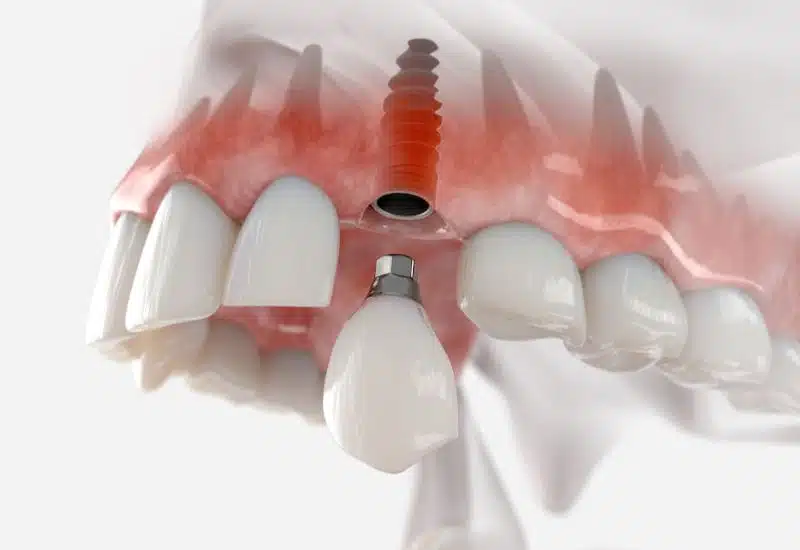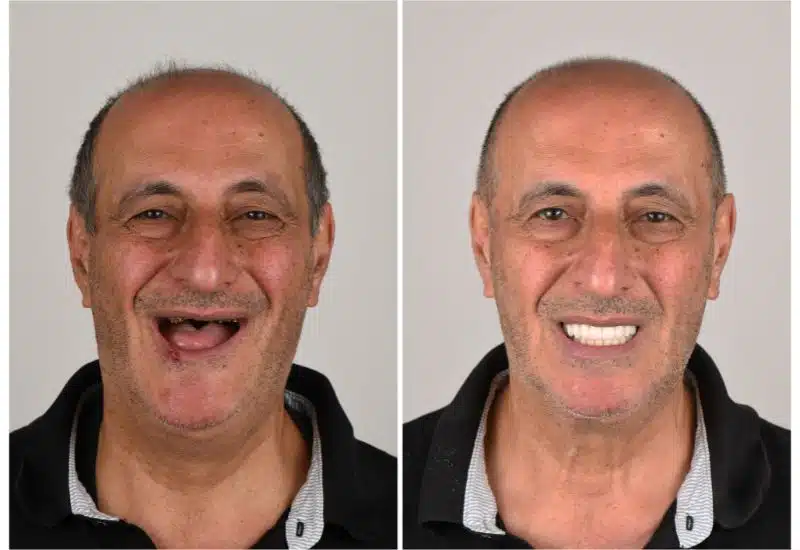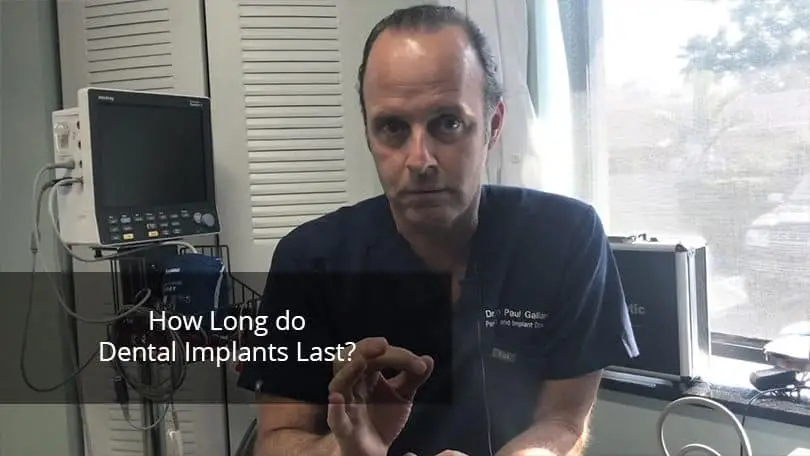Home / Dental Services / Dental Implants
Dental Implants in Miami
Dr. John Paul Gallardo, a renowned periodontist and implant expert, offers the best dental implants in Miami at competitive prices. Using state-of-the-art technology and premium materials, he provides high-quality, long-lasting, natural-looking solutions for missing teeth. Whether you need a single or multiple tooth replacements, contact us and rejuvenate your smile with Miami’s leading dental implant specialist.
Why Gallardo Periodontics is Miami’s Top Choice for Dental Implants
- Expert Care: Dr. Gallardo brings 30 years of experience in dental implants and specialized periodontics, trusted by patients across South Florida.
- Flexible Solutions: Whether you need a single tooth replacement, support for multiple teeth, or partial dentures, implants offer tailored solutions.
- Durable Materials: We offer titanium implants, known for their strength and ability to fuse with the jawbone.
- Natural Look and Feel: Implants blend seamlessly with your natural teeth for a confident, long-lasting smile.
- High Success Rate: Implants have a proven high success rate, providing a stable, long-term solution for missing teeth.
Dental Implants Before and After Photos
What are Dental Implants?
Dental implants are artificial tooth roots made from biocompatible materials like titanium or zirconium. Tooth implants are surgically embedded into the jawbone, where they integrate with the bone to provide a stable base for replacement teeth.
Support a dental bridge or denture:
The Advantage for patients missing multiple teeth is that dental implants can be used to support a dental bridge or denture. This not only restores the appearance of a full set of teeth but also improves function, which allows patients to eat and speak with ease.
Single Tooth Implants:
A single tooth implant is composed of an implant post, an abutment, and dental crowns. This option is ideal for replacing a single missing tooth, providing a natural-looking and functional solution that blends seamlessly with the surrounding teeth.


Why Choose Implant Dentistry?
Dental implants are widely considered the gold standard in tooth replacement solutions. As a cornerstone of cosmetic dentistry, the key advantage of dental implants over other tooth replacement options is their ability to stimulate bone growth, preserving your jawbone’s integrity.
With their superior durability and longevity, dental implants provide a permanent solution to missing teeth. This will enhance your smile and overall oral health for a lifetime.
Quality Dental Implant Materials at Gallardo Periodontics
Dental implants are not a one-size-fits-all solution. They come in different materials to cater to different patient needs and preferences. At Gallardo Periodontics and Implant Dentistry, we offer both titanium and zirconium dental implants.
Titanium Dental Implants
Titanium dental implants have been used for decades and are known for their strength and durability. Titanium is a biocompatible material, which means it can fuse with your jawbone without causing any adverse reactions. This makes titanium implants a reliable and long-lasting tooth replacement solution.
Zirconium Dental Implants
Zirconium dental implants are a newer addition to the world of implant dentistry. They are made from a type of ceramic that is also biocompatible. Zirconium implants are white in color, making them an excellent choice for patients who want their implants to blend seamlessly with their natural teeth. They are also hypoallergenic, making them a suitable option for patients with metal allergies.
Good Candidates for Dental Implants in Miami
The best candidate for implants is someone in good general health who has adequate bone density in the jaw to anchor the implant. Candidates should also practice good oral hygiene and be dedicated to regular dental examinations to monitor their oral health.
Tooth implants are the right dental solution for you if you have experienced tooth loss and are looking for a permanent, natural-looking replacement. They are an effective solution for those who want to restore both oral function and appearance. Dr. Gallardo offers thorough consultations to evaluate your suitability for dental implants and discuss the best treatment options for your unique needs.
What Our Patients Say
Committed to your results
What to Expect During Your Dental Implant Consultation in Miami
During your dental implant consultation with Dr. Gallardo, you can expect a thorough evaluation of your dental health and a discussion of your specific needs and goals. The consultation may include:
- Oral Health Assessment: A detailed dental exam with X-rays and possibly a 3D jaw scan to evaluate your teeth, gums, and bone.
- Medical History Review: Consideration of any health factors that may influence the implant’s success.
- Treatment Options: Discussion on the most suitable types of tooth implants for you.
- Procedure Walk-through: Explanation of the implant process, healing process, and prosthetic placement.
- Customized Treatment Plan: A step-by-step plan tailored to your needs, possibly including additional procedures like bone grafting or extractions.
- Cost Estimate: A breakdown of the treatment costs, payment methods, and insurance coverage options.
Dr. Gallardo will gladly address any questions or concerns you may have, ensuring you feel confident in your decision.

Dental Implant Cost in Miami, FL
Why Prices Vary Based on Complexity
The cost of dental implants in Miami can vary based on key factors. These include the complexity of your case, the type of implant you need, and whether any additional treatments are required. While cheaper options might seem appealing, remember that lower prices often come with sacrifices in quality, materials, or expertise. Choosing an experienced specialist who uses advanced dental technology ensures your dental implants are long-lasting and maintains the health and function of your smile.
Don’t compromise on quality—Visit our dental office today to get a personalized treatment plan and discover the best solution for your smile in Miami, FL.
The Dental Implant Procedure Explained
Dental implant surgery involves a three-phase process
The dental implant procedure at Dr. Gallardo’s practice is a simple and personalized three-step process designed to restore your smile with care and precision. Each stage is carefully planned to ensure your new teeth look natural and function perfectly. While the entire process can take several months, the results are long-lasting and worth the wait. Here’s how it works:
Step 1
Implant Placement
Dr. Gallardo will first numb the area with local anesthesia and for added comfort. We offer sedation options such as intravenous (IV) conscious sedation or nitrous oxide (laughing gas). After ensuring you’re comfortable, small incisions are made in the gums to expose the bone. Then, the implant is carefully placed into the jawbone. The gum tissue is then stitched over the implant, allowing it to heal and integrate with the bone. This integration occurs over the next three to six months. Temporary crowns may be placed to cover the implant posts during this healing period.
Step 2
Post Placement
Once the implant has fused with the jawbone through a process called osseointegration, Dr. Gallardo will attach a small post, known as an abutment, to the implant. This post serves as the foundation for your new tooth. In some cases, the post may be placed at the same time as the implant during the initial procedure. After the post is attached, the gum tissue will heal around it.
Step 3
Permanent Crown Attachment
In the final stage, a custom-made permanent crown is attached to the post. This crown is designed to match the look and feel of your natural teeth. After this step, you’ll have a fully restored, functional smile. You can care for your implant just like your natural teeth, ensuring long-lasting results.

Care and Recovery from Dental Implant Surgery
Recovery from dental implant surgery varies depending on the individual and the extent of the procedure. It is common to experience some swelling, discomfort, and minor bleeding in the days following surgery.
Dr. Gallardo will provide detailed aftercare instructions to ensure a smooth and comfortable recovery process. It is essential to follow Dr. Gallardo’s aftercare instructions and attend any scheduled follow-up appointments to ensure the success of your dental implant procedure.

Maintaining Your New Perfect Smile's Longevity
Dental implants are built to last, often for a lifetime with proper care. They can handle daily use and, unlike natural teeth, won’t decay. By following these simple tips and keeping up with your oral care routine, you can enjoy your dental implants for many years:
- Brushing your teeth at minimum twice per day with a soft-bristled toothbrush.
- Use dental floss daily to remove plaque and food debris from between your teeth and surrounding your implant.
- Rinsing with an antimicrobial mouthwash to help kill bacteria and prevent gum disease.
- Scheduling regular dental examinations and cleanings to monitor the health of your implants and adjacent teeth.
- Refrain from smoking and excessive alcohol consumption, as these habits can negatively impact the health of your implants and surrounding tissues.

Why Choose Dr. Gallardo as Your Dentist for Dental Implants
When you’re considering periodontal or dental implant services, Dr. John Paul Gallardo is an optimal choice for many reasons:
- Extensive Experience: With 30 years in practice, Dr. Gallardo offers a wealth of experience.
- Expertise in Periodontics and Implants: He is an expert in both periodontics and dental implantology, ensuring comprehensive care.
- Commitment to Quality: His meticulous attention to detail and proprietary techniques translate to enduring outcomes for patients.
- Continual Education: Dr. Gallardo is dedicated to remaining at the cutting edge of his field by actively engaging with professional organizations and peers.
- Modern Facilities: His practice in Miami is equipped with the latest technology for safe and effective treatments.
- Reduced Recovery Time: Treatments are designed to ensure patients experience minimal downtime.
- Exclusive Sedation Options: He is among a limited group of practitioners offering IV conscious sedation in South Florida, enhancing patient comfort.
Choosing Dr. Gallardo means entrusting your dental care to a seasoned professional who prioritizes safety, comfort, and the most advanced treatment options.
Dental Implants in Miami FAQ
What are dental implants?
A dental implant is a metal post that acts as a replacement for the root portion of a missing tooth. Made of biocompatible materials, typically titanium, this post is surgically placed into the jawbone. It serves as a sturdy foundation for a replacement tooth.
After the implant has fused with the bone in a process called osseointegration, an abutment is attached to the implant. This abutment serves as the connector between the implant and the artificial tooth, such as a crown. The crown is custom-made to match the shape, size, and color of your natural teeth, providing a seamless and durable solution.
Dental implants are a long-lasting option for restoring missing teeth, offering both functional and aesthetic benefits. They allow patients to chew and speak normally and help preserve the jawbone, preventing bone loss that can occur when teeth are missing.
What are dental implants made of?
Dental implants are typically made of titanium, a strong, biocompatible metal that integrates well with the jawbone. Titanium is preferred because it allows the implant to fuse with the bone in a process called osseointegration. This provides a stable foundation for the replacement tooth. Some implants may also be made from zirconia, a durable ceramic material, used as an alternative for patients with metal sensitivities. Both materials are safe, durable, and long-lasting.
What are the benefits of dental implants?
Dental implants offer numerous benefits for individuals with missing teeth. One of the key advantages is that they provide a long-lasting, durable solution, functioning just like natural teeth. This means you can eat, speak, and smile with confidence. Since implants are securely anchored in the jawbone, they don’t shift or move like dentures, ensuring a comfortable fit.
Another major benefit is that implants help maintain the health and structure of your jawbone by preventing bone loss. This helps preserve the natural shape of your face and jawline.
In terms of aesthetics, dental implants are custom-made to match your natural teeth. This gives you a perfect smile that blends seamlessly with the rest of your teeth. They are a reliable solution that can restore both your appearance and oral health. These offer you a lifetime of comfort and confidence when cared for properly.
What is the downside of dental implants?
The major downside of dental implants is their cost, which tends to be higher than other tooth replacement options like bridges or dentures. A single implant can cost several thousand dollars, making it a larger upfront investment. However, implants are often seen as a one-time investment due to their durability and longevity. With proper care, they can last a lifetime, unlike dentures or bridges, which may need periodic replacements.
Additionally, since the procedure involves surgery, there are some potential risks, such as infection or complications. However, these risks are minimal when you work with a skilled dentist who has extensive experience in implant placement. A well-trained professional ensures proper technique and post-operative care, reducing the likelihood of any issues. Given the long-term benefits, he higher cost is often considered more than worth it in the long run.
How much does it cost to get a dental implant in Miami?
The cost of a dental implant in Miami can vary depending on factors. These include the type of implant, additional procedures (such as bone grafting), and the dentist’s expertise. Prices can go higher based on your specific needs. To make dental implants more accessible, many patients use dental insurance, which may cover part of the procedure depending on the plan. Additionally, popular healthcare credit options like CareCredit or LendingClub can help you finance the procedure with flexible payment plans. These options allow you to spread out the cost over time, making dental implants a more affordable solution for restoring your smile. Consult with your dentist to explore the best financial options for your situation.
Can dental implants be covered by insurance?
Dental implant coverage depends on your specific dental insurance provider. Some insurance plans may cover part of the surgical process. Others may only cover the dental bridge, crown, or prosthesis supported by the implant. For questions about insurance or payment options, it’s best to contact Dr. Gallardo’s office, where the staff is always happy to help.
Do dental implants fail often?
No, tooth implants have a high success rate of over 90%. Most cases of implant failure can be traced back to inadequate aftercare, such as not maintaining proper oral hygiene. By following Dr. Gallardo’s aftercare instructions, which promote proper healing, the likelihood of implant failure is minimal.
Are dental implants painful?
Most patients report minimal pain during and after the dental implant procedure. Dr. Gallardo utilizes advanced techniques and provides detailed aftercare instructions to ensure patients are as comfortable as possible throughout the process. You may experience discomfort when transitioning back to solid food after starting with soft food post-surgery.
Can dental implants be removed?
Dental implants are designed to be a permanent tooth replacement solution and are not meant to be removed. However, in rare cases where complications arise, a dental professional may need to surgically remove the implant.
Can dental implants fall out?
Dental implants are securely placed into the jawbone and are not expected to fall out or shift. Reasons for issues include trauma to the teeth or poor dental hygiene. By following proper aftercare instructions and maintaining regular dental check-ups, your dental implants should remain stable.
Can dental implants be done in one day?
While some dental emergencies , most require multiple appointments to ensure the best results. Dr. Gallardo will discuss the timeline for your specific case during your consultation in Miami.
What's the best age for a dental implant patient?
Patients must wait until their bone growth is complete before receiving dental implants, which typically occurs around the end of adolescence. Dr. Gallardo can advise you on temporary solutions and the best treatment options until your bones are fully developed and ready for dental implants.
How do dental implants compare to other dental treatments for missing teeth?
Dental implants are the gold standard for replacing missing teeth, offering unmatched durability, function, and aesthetics. Unlike dentures, which can slip and require adhesives, implants are permanently anchored to the jawbone. Bridges rely on altering healthy teeth for support, whereas implants preserve natural tooth structure. While other dental treatments may be quicker or cheaper, they lack the long-term stability, bone preservation, and natural feel of implants.
Can you get dental implants if you have a periodontal disease?
Yes, you can get dental implants if you have periodontal disease, but only after undergoing proper gum disease treatment. Periodontal disease weakens the gums and bones, which are essential for supporting implants. Your dentist will first focus on controlling the infection and restoring oral health before proceeding with implants. Proper planning and dental procedures can improve implant success.
Can you use Invisalign with implants?
Yes, you can use Invisalign with implants, but it depends on your dental situation. Since implants are fixed, Invisalign can only move natural teeth. If you need minor adjustments around an implant, a dentist can design a treatment plan accordingly. However, for patients with full mouth implants, Invisalign won’t be effective for tooth movement. Planning orthodontic treatment before getting implants is ideal.
Where can I schedule a dental implant appointment near me?
If you live near Miami, FL, Gallardo Periodontics and Implant Dentistry offers a range of dental services, including dental implants, Invisalign, tooth extractions, and maxillofacial surgery to meet your dental needs. Our dental implant center is conveniently located at 2020 SW 27th Ave, Miami, FL 33145, they can help restore your oral health with expert care.

